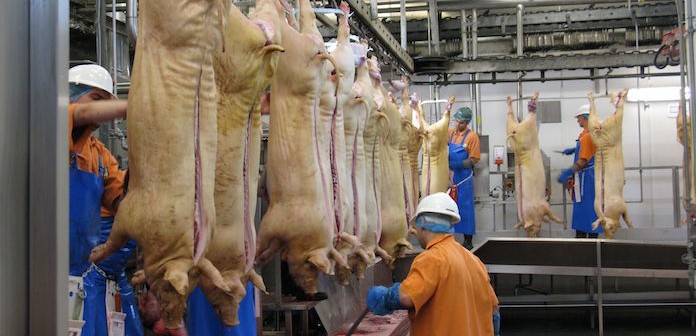The British Meat Processors Association has expressed concern that the Government’s new immigration rules will restrict access for migrants to fill critical labour shortages, while, at the same time, liberalising access where no vacancies exist.
The Government’s five-point plan to cut UK immigration includes increasing the minimum salary requirement for a skilled worker visa to £38,700, while the rule allowing the most-needed professions to be hired at 20% below the going rate would be scrapped.
The Government believes the move will help reduce net migration by 300,000 a year, but the BMPA has warned that the Government is in danger of imposing blanket rules to achieve arbitrary migration targets without considering the very different labour requirements and challenges of different industries.
Increasing the average salary threshold figure to £38,700 fails to take into account that the average is made up of both higher and lower salaries, and that it’s often in the lower bracket that worker shortages are most acute, the BMPA said.
“If companies have to start paying migrant workers more than the ‘going rate’ for a particular job simply to achieve the threshold and fill a vacancy, this will very quickly spark wage inflation across many industries as existing UK workers demand the same salary. In the case of the food industry, this will fuel more food price inflation,” it said.
“We agree that allowing migrant workers to be paid 20% less than the ‘going rate’ for a job is unfair, but raising the overall salary threshold for immigration isn’t the way to tackle this issue. Nor will it fix the problem of not enough British citizens being willing, available or able to fill these vacancies.
“Also, if the Government restricts the number of migrants that can come to the UK to fill the job vacancies that can’t be filled with British candidates, there will be an inevitable pressure on all sectors as they compete in a pool of workers that is simply not big enough to support a growing economy.
“In this scenario, it won’t be just private companies that struggle to recruit, but taxpayer-funded services will also suffer from worker shortages and higher costs.”
BMPA supports the sector-by-sector and job-by-job approach to assessing workforce needs recently advocated by Professor Brian Bell, chair of the Migration Advisory Committee.
He describes a much more granular approach to identifying the industries and roles where the labour shortage is most acute. It makes much more sense for our industry where the current blanket approach isn’t working. This is because each plant can experience labour shortages for very different and localised reasons.
A spokesperson for Downing Street called the package ‘the biggest clampdown on legal migration ever’, the Guardian reported. They added: “We believe this is a package which will enable us to significantly reduce numbers whilst achieving economic growth.”
The move has drawn widespread criticism, with former Defra Secretary George Eustice echoing some of the BMPA’s concerns.
He said: “Isn’t the problem with a skills-based immigration policy that it gives preferential access to bankers, to lawyers, to accountants, to economists, even though we have no need for such people in this country.
“We have plenty here, homegrown talent, but it actually makes it very difficult to recruit the people we do need – care workers, people who work in the food industry, in manufacturing, producing things generally or indeed in the tourism industry.”




